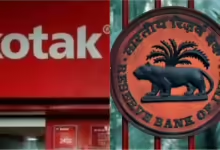Trade Setup: Concerns over the IT sector cause skepticism while the market rises on the Federal Reserve’s assurance
The US Federal Reserve’s pledge to stick with three rate reductions through 2024 provided impetus for the Nifty and other sector indexes to have a noteworthy comeback on Thursday. The Nifty closed above the desired 22,000 barrier, thereby breaking through the resistance levels set the day before. But despite the market frenzy, underlying doubts and worries remain, indicating a more complicated course for the future.

After days of weakness and consolidation, the day’s bounce saw the Nifty rise 170 points, indicating a significant comeback. Nevertheless, skepticism persists despite this rebound, fueled by divergent opinions from significant market participants.
One of the biggest asset managers in the US, Vanguard, expressed doubts about the durability of the market’s recovery and said that rate reductions may not occur until 2024. Furthermore, the market picture is further clouded by Vanguard’s claim that US markets are overpriced and the possible effects of the Fed’s decision to forgo rate decreases on global central banks and markets.
Accenture, a multinational IT services conglomerate, added to market anxiety by reducing its revenue growth estimate for the fiscal year 2024 from 2% to 3%. This adjustment was primarily prompted by economic uncertainty that resulted in lower client expenditure on consulting services, which raised worries, especially within the Indian IT industry.
Heavyweights in the IT sector, including TCS, Infosys, and Wipro, came under scrutiny after Accenture lowered their outlook. The IT index, which has been volatile, gained only 0.8% on Thursday and is still down more than 4.5% for the week, highlighting the industry’s susceptibility to market volatility.
Foreign investors continued to be net sellers in the cash market on Thursday, in contrast to the ongoing purchasing activity by local investors, despite the general market recovery. The Nifty ended the week at a level that was comparable to its Friday closing the previous week, indicating the market’s balance despite varying emotions.
Following the general market’s recovery, the Nifty Bank ended a nine-day losing run and slightly moved into positive territory for the week. Considering that the banking index has increased for five of the previous six weeks, it is unclear whether Thursday’s rebound will be sustained.
When looking at futures and options (F&O) cues, the market displays a variety of signals. March Nifty 50 futures saw 2.2% selling and 2.6 lakh shares in open interest, raising the premium to 90.55 points. In contrast, open interest for Nifty Bank’s March futures decreased by 1.2%. Significantly, the Nifty 50 put-call ratio increased from 0.79 to 1.2, indicating a change in the outlook for options.
SAIL rejoins the fold in the F&O Ban, while RBL Bank and Hindustan Copper leave. Businesses that are still on the prohibited list include Tata Chemicals, Piramal Enterprises, Balrampur Chini, Zee Entertainment, Biocon, and Indus Towers.
In anticipation of the March 28 expiration, there was an increase in open interest for Nifty 50 call strikes between 22,000 and 22,250, as well as a rise in interest for put strikes between 21,800 and 22,100. This indicates that market players are being cautious in light of the current uncertainty.
Investor attention is focused on a wide range of equities that are expected to see substantial movement as the market prepares for Friday’s trading session. This is an overview of the stocks that are attracting attention in the context of business changes and strategic moves, ranging from IT titans to infrastructure firms.
Accenture’s projection cut sends ripples through the IT sector: IT stocks like Infosys, TCS, Wipro, and HCLTech are under scrutiny after Accenture revised its revenue growth projection for the fiscal year 2024 to 1%–3%, down from the previous 2%–5%. The negative adjustment is a reflection of current economic uncertainty that affects client expenditure on consulting services, which has investors considering possible consequences for the IT industry.
Toubro & Larsen (L&T): All eyes will be on L&T’s board meeting on March 27, where talks about fundraising tactics are likely to take place and might impact the conglomerate’s image in the market.
Bharat Dynamics: The firm has shown its commitment to providing value to its shareholders and demonstrates confidence in its financial forecast by announcing an interim dividend of Rs 8.85 per share and approving a 1:2 stock split.
Texmaco Rail and Karnataka Bank: Both businesses have started Qualified Institutional Placements (QIPs) in an attempt to raise money, and their pricing methods are a reflection of calculated choices made to maximize investor interest and injection of funds.
Prestige Estates: The purchase of outstanding property in the National Capital Region (NCR) for the construction of an integrated township, “The Prestige City,” demonstrates the company’s aspiration for growth and marks a noteworthy entry into the real estate market.
DOMS Industries: The company’s decision to diversify and take advantage of new market prospects is shown by its entry into the bag manufacturing and retailing industry with the purchase of a 51% share in SKIDO Industries Pvt. Ltd.
Tata Communications: Tata Communications’ strategic restructuring efforts to maximize operational efficiency and unlock value are exemplified by the sale of its digital services division to its wholly-owned subsidiary Novamesh for Rs 458 crore.
Mazagon Dock Shipbuilders: The company’s continued operational and strategic efforts in the face of a changing maritime environment are highlighted by the extension given to Chairman and Managing Director Sanjeev Singhal and the leasing deal with the Mumbai Port Authority.
Wipro: By creating a new company, SDVerse LLC, via a step-down subsidiary arrangement with Magna International and General Motors, Wipro demonstrates its dedication to growing its market share and developing strategic alliances.
SAMHI Hotels: By extending corporate guarantees to lenders, SAMHI Hotels demonstrates its dedication to sound financial management and highlights its attempts to negotiate the constantly changing hotel industry while overcoming persistent obstacles.
Tata Chemicals: The company’s attention on fulfilling legal responsibilities is shown by the delivery of a penalty notice equivalent to Rs 104 crore from the Income Tax department, which emphasizes the significance of regulatory compliance.
Thursday saw a record-breaking rally in global stock markets, with key indexes in the US and Europe reaching all-time highs, while Asian markets had varying results.
Following record closings for all three main indexes during the normal trading session, US stock futures saw a little increase on Thursday night. After the firm revealed adjusted profits that exceeded analysts’ predictions but fell short of sales projections, FedEx shares shot up 13% in extended trade. On the other hand, as a result of sluggish growth in North America, athleisure retailer Lululemon saw an 11% decrease after releasing dismal forecasts.
All three of the main US stock indexes finished at all-time highs for the second day in a row. The Dow, S&P 500, and Nasdaq Composite all saw gains of around 0.7%, 0.3%, and 0.2%, respectively. These indicators have had four straight gaining sessions, which indicates that there has been persistent optimism in the US market.
In the wake of the Bank of England and Swiss National Bank’s monetary policy announcements on Thursday, European markets surged to new all-time highs. The pan-European Stoxx 600 index closed at 509.95 points, smashing the previous high established earlier in the month. Remarkably, almost every industry witnessed positive trading, with technology companies leading the gains and utilities seeing a little decrease. The market attitude was positive due to the Bank of England’s decision to keep interest rates as anticipated, which resulted in a substantial increase in UK equities.
On Friday, the Nikkei 225 index in Japan reached a new all-time high in Asia when it broke the 41,000 mark. Japan’s headline inflation rate increased to 2.8% in February from 2.2% in January, signaling an acceleration of inflation that helped the country reach this milestone. Core inflation, which does not include the cost of fresh food, increased as well, rising to 2.8% from 2% in February.
The GIFT Nifty moved down, indicating that the Indian market may have a flat to negative start, in contrast to the upward trend shown in overseas markets. Amidst dominant global signals, the Indian market opens with muted emotion, trading at a discount of over 10 points from Thursday’s Nifty Futures finish.







